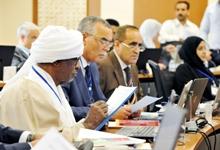
Typical street scene in Santa Ana, El Salvador. (Photo: iStock)
IMF Survey : IMF Advances Dialogue with Mideast Parliamentarians
January 14, 2015
- IMF and WTO meet with Arab parliamentarians in Kuwait
- Goal is to improve understanding of institutions’ roles
- Outreach focused on the region’s economic issues and reforms needed
The International Monetary Fund (IMF) and the World Trade Organization (WTO) reached out to parliamentarians from the Middle East and North African (MENA) countries, sponsoring a seminar to foster greater understanding of the global and regional roles of the two institutions and exchange views on the economic issues facing the region.

IMF reaches out to parliamentarians from the Middle East and North Africa to exchange views on the Fund’s role and the economic issues facing the region (photo: IMF)
MIDDLE EAST OUTREACH
The seminar was held during December 2-4 at the IMF Middle East Center for Economics and Finance (CEF) in Kuwait City. Twenty-six members of parliament from many Mashreq and Maghreb countries—Algeria, Jordan, Libya, Mauritania, Morocco, Sudan, West Bank and Gaza, and Yemen—attended the event.
The workshop—the fourth in one year—came as part of the IMF’s recent efforts to expand its dialogue with legislators, civil society representatives, journalists, and academics from all over the world. The aim is to improve the Fund’s understanding of the political and social context in which economic decisions are made and to clarify the rationale for its policy advice. Previous events were held at the CEF for Gulf parliamentarians and legislators from Mashreq and Maghreb countries and for members of parliament in Jordan.
“The IMF is committed to transparency in its work, to explaining itself, and to listening to the people whose lives it may affect,” says Raja Almarzoqi, advisor in the IMF’s Middle East and Central Asia Department. “Engagement with parliamentarians is important because they are the ones passing economic legislations in their countries,” he added.
Interactive discussions
The workshop combined topical macroeconomic and trade policies and issues (for example, jobs and growth, energy subsidies, fiscal policy, monetary and exchange rate policies, accession process to the WTO, and preferential trade agreements).
IMF staff explained the Fund’s policy analysis and advice based on best practices and country experiences. Presentations helped identify successful policies and reforms, with an emphasis on the tradeoffs among reforms, growth, and the fiscal and social sustainability of policies.
Discussions were lively and candid as participants asked many questions and made numerous interventions—some of which were critical of the IMF’s role. However, they showed a genuine interest in the topics that were discussed over three days in an open and interactive manner.
Legislators enriched the dialogue by sharing experiences as well as political economy challenges of noticeable similarity. They indicated that the workshop was “one of a kind” in terms of focus and high policy content.
The IMF’s image
Participants welcomed the opportunity to exchange views on regional economic issues with IMF staff and fellow parliamentarians from across the region. Some agreed that the Fund’s image is improving, albeit at a slower pace in some countries. Others thought that the misunderstanding about the actual role of the IMF can be changed as Fund staff interact more with different stakeholders, including legislators.
“The perception about the Fund in the Arab world is that it dictates fiscal and monetary policies to governments in developing countries and that it prescribes the same policies to all countries irrespective of social consequences,” said Rula Al-Farra, Member of the Labor, Human Development, and Education Committee in the Jordanian National Assembly. “This workshop helped correct some of these misperceptions,” she added.
In the same vein, Arafat Aatmoun, Deputy Chair of the Financial and Economic Development Committee in the Moroccan Parliament acknowledged the importance of the workshop in addressing some misunderstanding about the real role of the IMF. “I can now understand how the IMF tries to help countries with policy advice,” Aatmoun said. “However, an ounce of prevention is better than a pound of cure and, therefore, the Fund should help countries follow a more preemptive approach of economic policymaking,” he added.
Call for sustained engagement
Seminar attendants appealed to the IMF and WTO to continue their engagement and active outreach and help build parliamentarians’ capacity on policy issues that they are grappling with.
“I believe that the IMF’s outreach for parliamentarians is very useful but might need to expand to include more specialized workshops to give more details about macroeconomic topics of interest” said Sahar Alqawasmi , member of the Legislative Assembly in West Bank and Gaza.
Some participants asked if the 188-member international institution can further step-up outreach at the country level.
“We hope that the IMF can organize similar events, especially for specific countries in the region with exceptional political circumstances,” said Howida Adam, member of the National Assembly in Sudan.
IMF staff further explained the ongoing training and outreach programs in the Middle East and North Africa.
“This seminar—targeted to parliamentarians—as well as other outreach and training events geared to the media and civil society broadens our engagement with stakeholders beyond the traditional counterparts, mainly governments,” Philippe Karam, then Acting Director of the CEF, told the audience. “Despite its young age, the CEF has had a tremendous impact on the IMF’s capacity building effort in the region. Since it began operating in May 2011, the center has offered about 130 activities, and provided training to more than 4,000 officials from the 22 countries of the Arab League,” he added.







